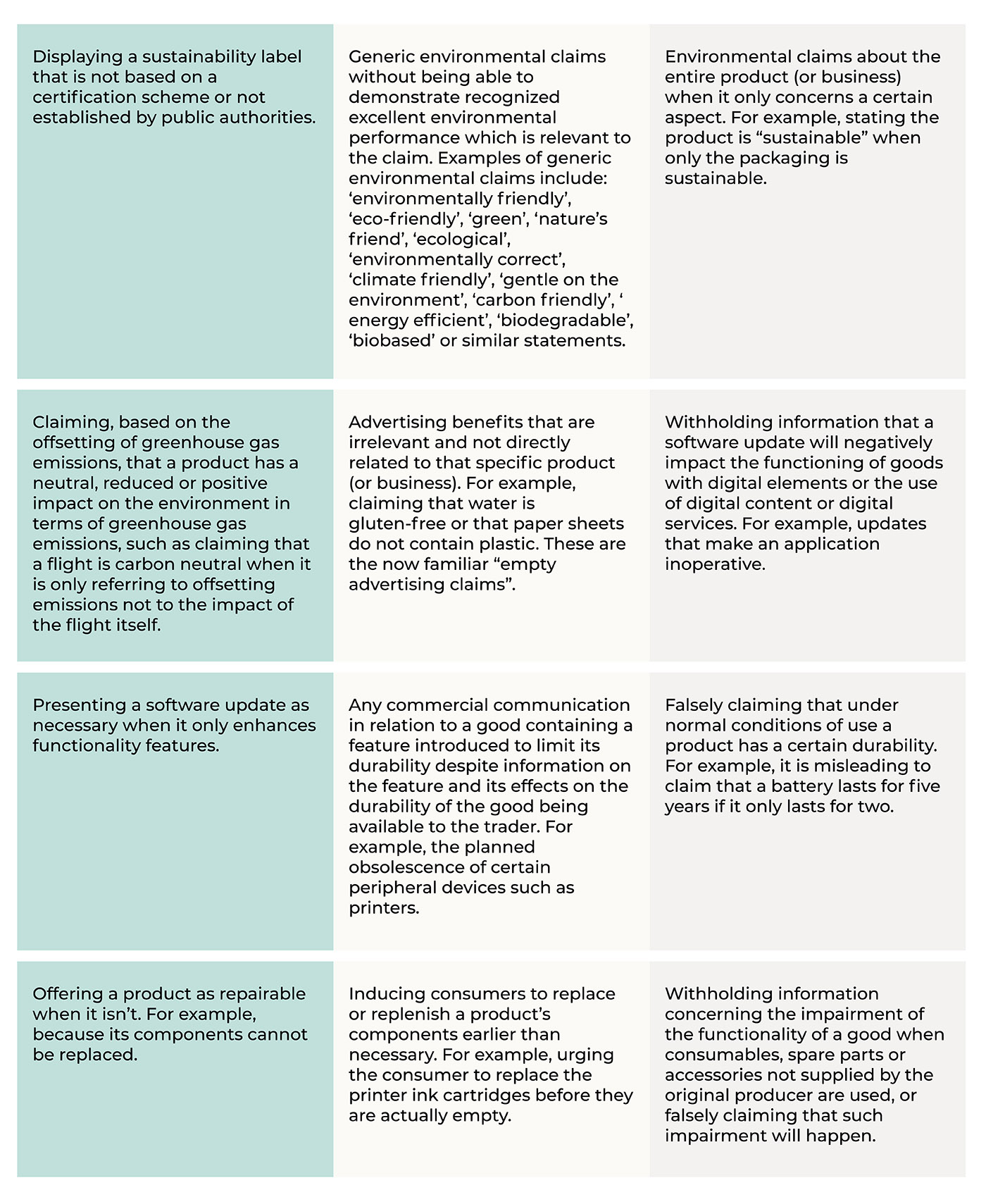The new EU Directive seeks to put an end to greenwashing and early obsolescence practices. The majority of the obligations it lays down are already punishable through existing unfair competition regulations. However, the new EU greenwashing directive fills certain legal voids.
The Greenwashing Directive puts down in black and white what we already knew: do not lie about the environmental benefits of your company, product or service. This obligation is not new. Misleading acts were already prohibited under the 1964 Advertising Statute (what a great text) and this remains the case in the current Unfair Competition Law. The new features that the European lawmakers have introduced are aimed at making it clear – very, very clear – that environmental claims are important for consumers, competitors and the planet. Akin to a blacklist, it leaves little room for interpretation. It is now time to update compliance plans, and train marketing and communication managers.
Greenwashing is an advertising practice that consists in making a company, product or service seem more environmentally friendly than it actually is, in order to appeal to consumers’ growing interest in sustainable development and corporate social responsibility, but without adopting a real commitment to protect the planet.
The Directive also clarifies what companies can or cannot say and in some cases, how to do so. Here the aim is to avoid “green hushing”, a term that refers to those companies that prefer to hide their sustainability strategies to avoid being accused of greenwashing or of not doing enough for the environment. The Ministry of Social Rights and the 2030 Agenda has published the “Sustainable Communication Guide: how to include environmental information in your strategies and campaigns”, which may prove extremely useful in helping businesses make sure that their environmental claims are accurate and that they are not accused of being greenwashers.
Advertising must be legal, accurate, authentic and respect free competition
The fight against misleading advertising is not new. In the 60s, the Advertising Statute included a principle that, based on common sense, continues to be fully valid today, even though it has been repealed: “In the performance of every advertising activity the principles of legality, accuracy, authenticity and free competition must be observed”. The problem is that at times it is not easy to determine when an advertising claim is accurate, in the sense of not being misleading.
For example, the current Unfair Competition Law considers misleading any conduct entailing false information or information that, although accurate, may lead its recipients to an error in judgment and is liable to alter their economic behavior. In other words, if the information is false but does not influence the consumer’s purchasing decision, it may not be misleading. The law gives us clues about claims that are bound to affect consumers’ economic behavior, such as the characteristics of the goods or services, their price, after-sales assistance, etc., but no reference is made to environmental claims.
Against this backdrop, the recently approved Greenwashing Directive 2024/825 of February 28, 2024, seeks to regulate the use of environmental claims with a view to “enabling buyers to make more sustainable decisions and reduce the risk of greenwashing through reliable, comparable and verifiable information” (link).
The Directive makes it easier to evidence the unfair practices involved in misleading environmental claims
The greenwashing Directive fills the voids of the Unfair Competition Law in defining the types of conduct that are misleading and which alter consumers’ economic behavior. To do this it includes “environmental or social characteristics, accessories, circularity aspects, such as durability, reparability or recyclability among the features of products that may mislead consumers.” This amendment will undoubtedly help to prove the unfair practices behind greenwashing.
Extension of unfair commercial practices
The Directive extends the list of unfair practices that are unquestionably considered to be unfair, although it is not a closed list. Other practices that are not included in the text may be equally unfair.

The text basically establishes that environmental, social, reparability or durability claims about products are important for consumers, which means that much more care should be taken when looking at what we say, don’t say or what we suggest in advertising.
Prohibition on empty environmental promises
One of the new features of the Directive is the prohibition on empty environmental claims. Specifically, making an environmental claim related to future environmental performance without clear, objective, publicly available and verifiable commitments set out in a detailed and realistic implementation plan that includes measurable and time-bound targets and other relevant elements necessary for its implementation, is considered misleading.
The fulfillment of these promises must be verified by a third party expert, who should be independent from the trader, free from any conflicts of interest, with experience and competence in environmental issues and who should be able to monitor the progress of the trader regularly with regard to the commitments and targets, including the milestones for achieving them. It is a type of environmental audit which must also be made available to consumers.
New criteria for comparative advertising based on environmental characteristics
As far as the so-called misleading omissions are concerned, the Directive regulates the manner in which comparative advertising based on environmental characteristics should be carried out. Indeed, where a trader compares products or services based on their environmental or social characteristics or on circularity aspects (e.g., durability, reparability or recyclability), it must provide information about the method of comparison, the products which are the object of comparison and the suppliers of those products, as well as the measures in place to keep that information up to date.
The provision also indicates that comparisons must be objective by comparing products which serve the same function, using a common method and common assumptions, and comparing material and verifiable features.
When does it come into force?
Yesterday (it’s a trick question). EU countries must transpose the Directive into their national law by March 27, 2026 and the rules will apply from September 27, 2026. However, the truth is that the majority of the obligations it contains are already punishable via unfair competition regulations, so greenwashing cannot be ignored until then.
Intellectual Property Department






